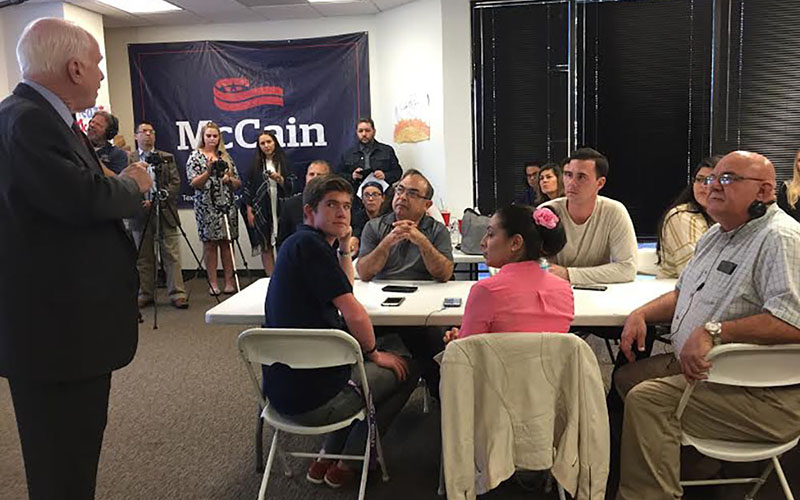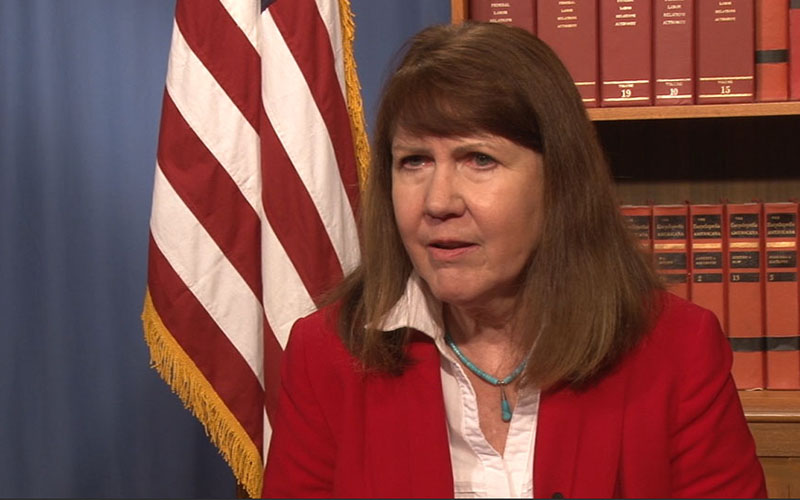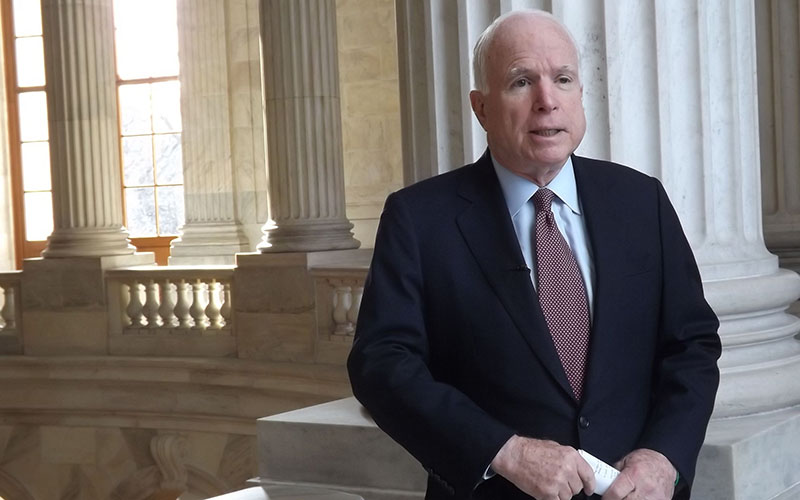
Sen. John McCain, R-Arizona, visits volunteers at the Unidos Con McCain office in Phoenix, where they were staffing a Spanish-speaking phone bank to reach out to Latino voters. (Photo courtesy McCain campaign)

Rep. Ann Kirpatrick, D-Flagstaff, said she plans “to fight … every step of the way” for the Hispanic vote in her race to unseat Sen. John McCain, R-Arizona, this fall. (Photo by Katie Bieri/Cronkite News)

Sen. John McCain, R-Arizona, said there is “no doubt” Hispanics will be “a very, very important sector of those who will be determining winners or losers in these … campaigns.” (Photo by Katie Bieri/Cronkite News)
WASHINGTON – The campaign to re-elect Sen. John McCain, R-Arizona, is calling on Latino voters this year – literally and figuratively.
McCain, who has always done Hispanic outreach, visited his campaign’s first-ever Spanish-speaking phone bank Thursday at the Unidos con McCain office in Phoenix, more evidence of the increasing importance of Latino voters this year.
“I’ve always enjoyed good support from the Hispanic community in Arizona, but like any other group (of voters), I have to work hard to gain their support and their votes,” McCain said in an interview in Washington earlier this month.
He’s not the only one. The leading Democratic challenger for his seat, Rep. Ann Kirkpatrick, D-Flagstaff, said of the state’s growing Latino electorate that she plans “to fight to earn their vote every step of the way.”
“I think Arizona is almost a 50 percent minority state now. That includes Native Americans, the Latino community, and Asian-Americans and African-Americans,” she said. “It’s exciting. It’s very exciting for Arizona’s future.”
Analysts and Hispanic groups say that trend is likely to be the new normal for politics in Arizona and beyond.
“I think what is happening in Arizona is symptomatic of what is happening in the rest of the country,” said Maria Teresa Kumar, president and CEO of Voto Latino.
It was one of nine groups that gathered in Washington this week for a summit on energizing the growing Hispanic electorate nationwide.
Kumar said the average age for Latinos in the U.S. is 27 – well within the millennial age bracket, which is variously described as between age 18 and 30 or 35.
The Pew Hispanic Center said 22 percent of Arizona voters in 2014 were Latinos. That was a larger share of eligible voters than in all but three states.
“The Latino population is growing quickly, and more quickly than any other vote,” said Jens Manuel Krogstad, a writer and editor for Pew Hispanic. “That growth is really being driven by young people.”
Arizona is no exception. Pew statistics said 43.3 percent of Latino voters in the state are millennials.
McCain said he thinks millennial Hispanic voters are “frankly much more politically engaged than perhaps their predecessors were.”
“I would argue that most young Hispanics today are willing to listen to the message of both sides and, like all millennials, they’re going to make up their own minds,” said McCain.
But a recent poll shows that Hispanic voters in the state may be leaning Democratic.
The January poll by the Behavior Research Center said McCain would get 32 percent of the likely Hispanic vote to 49 percent for Kirkpatrick in a head-to-head contest between the two. That was a sharp change from a November poll, which Kirkpatrick got just 32 percent of Latino vote to McCain’s 31 percent.
While he questioned the poll numbers, McCain said “there is no doubt that the Hispanic vote is a very, very important sector of those who will be determining winners or losers in these election campaigns.”
He said he has an advantage in his long-standing relationship with the Hispanic community, which gives him a “certain element of credibility” among voters.
His campaign is working to make sure that message is heard, with outreach like the phone bank, whose volunteers called more than 6,000 Spanish-speaking voters in Arizona Thursday, according to campaign officials.
Ben Monterroso, executive director of Mi Familia Vota, said McCain has “done good work” for Hispanics, but that the Republican Party “doesn’t allow him to do what the community needs.”
Monterroso, who was at the event with Kumar, said that McCain “needs to figure out how he can balance his performance” with Arizona Latinos.
Kumar agreed, saying that McCain “did right by the Latino community” by leading the fight in 2013 for comprehensive immigration reform, then adding that he “also basically said that we needed to ‘build a darn fence.'”
Kirkpatrick said she thinks Hispanic voters are more likely to vote for someone supports DREAMers, immigration reform and “good-paying jobs.”
“And that’s what I do,” she said. “Put Arizona first.”
“I hear from working families who really value education, but they’re struggling to put their children through school,” Kirkpatrick said, and are fighting “so they, too, can have a stake at the American dream.”
She said voters “are frustrated with politics as usual,” adding that McCain is “the prime example of out-of-touch, Washington establishment.”
“They (Hispanic voters) are very engaged, they’re interested in new leadership,” Kirkpatrick said. “They want somebody who’s fighting for those ideas and those issues and pushing for comprehensive immigration reform.”
But Krogstad said that, when asked which issues are most important, Latino voters “ranked the economy and education as their most important issues. After that is healthcare, and coming in at number four is immigration.”
Whatever the issue, both McCain and Kirkpatrick express confidence they can win Hispanic votes.
Kirkpatrick points to her “diverse congressional district” and said she has always been engaged in heavily Hispanic Pinal County – a county that McCain won handily in 2010, his last re-election bid.
“There is no doubt that in a certain number of years the Hispanic population will be in the majority in Arizona,” McCain said. “That’s a political reality.”
He said he has confidence in his Hispanic outreach, and believes it will pay dividends in the upcoming Senate election. But he cautions that if “the Republican Party wants to survive in many parts of America, we’re going to have to do a better job with the Hispanic community.”
That Hispanics are even being talked about is evidence of the change, Monterroso said.
“Any other time, there would have been no need to talk about it (Hispanic voters) because McCain would be a sure winner,” he said.
– Cronkite News reporter Katie Bieri contributed to this report.
– Cronkite News video by Katie Bieri